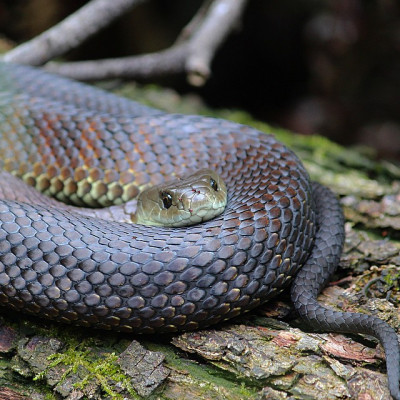
In Wyndham, the most common snakes are the Tiger Snake, Eastern Brown Snake and the Little Whip Snake. The Tiger Snake is the most common snake in suburban areas, especially near water and more vegetated areas such as creeks, wetlands and native bush lands.
Snakes on Private Property
Snake Management Service Update
From 1 September 2025, Wyndham City will no longer provide a free snake removal service for private properties.
We will continue to offer free removal for snakes found on Council land such as parks, reserves, and nature strips.
Why is the service changing?
A recent review of the service found that half of all callouts resulted in no snakes being found, false alarms and that snakes were in fact blue-tongue lizards.
Council is now focusing its efforts on education and prevention.
What do I need to do?
After 1 September 2025, you will need to contact a licensed private snake catcher Reptile Relocations 0423 474 604.
If you see a snake on Council land, call us on 1300 023 411 and we will arrange its removal and relocation.
Staying Safe
Preventing snakes starts with good property maintenance:
- Keep grass trimmed
- Remove debris, wood piles and clutter
- Seal gaps under doors and around sheds
- Keep pet food areas clean
Snake Service Changes – Frequently Asked Questions
Is Council still offering a free snake removal service?
Yes – Council will continue to provide free snake removal for snakes found on Council-owned land, such as parks, reserves, and nature strips.
However, from 1 September 2025, Council will no longer offer a free snake removal service for private properties.
Why is Council changing the service?
A recent review found that more than half of the callouts involved no snake being found or were false alarms, often mistaking blue-tongue lizards or other animals.
This change ensures better value for ratepayers while increasing the focus on community education.
When will the change happen?
The change takes effect from 1 September 2025.
Until then, Council will continue to respond to private property snake removal requests as usual.
What should I do if I see a snake on my private property after 1 September 2025?
You’ll need to engage a licensed private snake catcher.
Council will provide a list of local licensed snake catchers on our website closer to the transition date.
How much does it cost to remove a snake privately?
Fees vary by provider. Council encourages residents to only call a catcher if the snake has been sighted and is being monitored.
What if I can’t afford the fees?
Speak to the service provider for options on payment.
What if the snake is in a park, reserve or on a footpath?
If the snake is on Council land, such as a park or nature reserve, Council will continue to respond. Call Customer Service on 1300 023 411 to report it.
What is considered private property vs Council land?
- Private property includes your home, backyard, front yard, garage, and driveway.
- Council land includes parks, nature reserves, footpaths, roadsides, and public open spaces.
Why not just keep the service for residents?
While Council understands this concern, the service was originally a temporary measure and has now become unsustainable.
Many callouts are for:
- Animals that aren’t snakes (Blue-tongue lizards – which are protected)
- Snakes that have already left the area before the catcher arrives
Shifting to education will help residents prevent and respond safely to snakes in a more cost-effective way.
What is Council doing instead?
Council will increase its education and prevention efforts, including:
- Tips on reducing snake-friendly conditions around the home
- Advice on what to do if you spot a snake
Learn about local snake species
Contact: Reptile Relocations 0423 474 604
How can I keep snakes away from my property?
- Keep grass short and remove piles of wood, debris or corrugated iron
- Seal gaps under doors and around sheds
- Keep bird aviaries, chicken coops and pet food areas clean
- Avoid leaving water bowls or fishponds uncovered
Snake safety for your pet
- Keep cats indoors.
- While out walking your dog, keep them on a lead.
- Stay on paths where snakes are move obvious.
- Don’t allow pets to explore long grass or dig in ground cover. If your pet seems unusually interested in something hidden in the grass, back off until you know what it is.
- If your pet is bitten by a snake, seek immediate veterinarian assistance.se
Steps to avoid snake bites:
It’s important to remember that snakes are naturally shy animals, wary of predators including humans. They will react defensively if cornered or caught off-guard and will often flatten their necks to appear larger when threatened. To avoid snake bites, use common sense and:
- Wear sensible clothing – closed toe shoes, socks and jeans are usually adequate.
- Never reach into or under hollows, logs or thick grass without looking first.
- Stay on footpaths when enjoying Wyndham’s natural areas and open spaces.
- Watch where you are walking and supervise young children and pets.
Snakes are a native animal and are protected under the Wildlife Act 1975. It is illegal to capture, harm or kill these protected species.